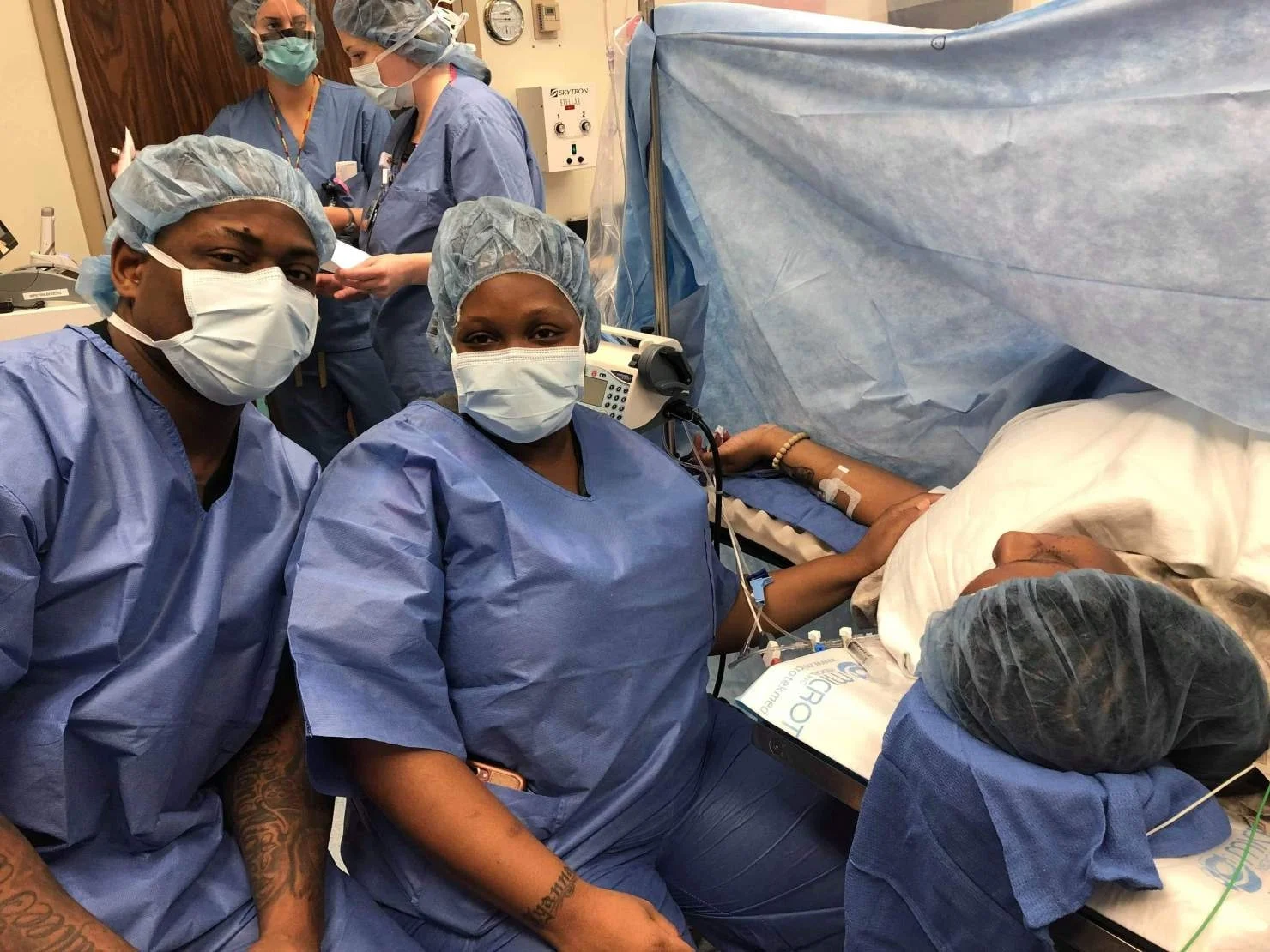
Written by: Essiryjhe Bowden, Program Officer | Youth, International & Policy Programs
Social Workers and Doulas
The roles of social workers and doulas are similar as they both relate to childbirth and birth support. Doulas are professional trained individuals who provide emotional, physical, and educational support to birthing persons before, during, and after childbirth. Doulas play an essential role in assuring birthing persons are aware of their birthing rights and have a healthy and safe childbirth experience. Pregnancy and childbirth are very exciting, yet scary, moments. Perinatal social workers assist families, individuals, and communities as they navigate any challenges that emerge before, during, or after childbirth. Various factors challenge the ability to enjoy pregnancy and childbirth such as medical diagnoses, high risk pregnancies, obstetric violence, drug use, family conflict, and poverty.
Although the roles of social workers and doulas are similar, they both support individuals and families in different ways while advocating for their needs. The profession of social work is very clinically focused, where mental health assessment and treatment plans are valued. This includes making sure long term support and services are in place even after childbirth. Doulas are more hands-on, focusing on the birthing person’s immediate needs, such as comfortability. Both professions have an extensive knowledge on birth justice, pregnancy, parenting, resources, advocacy, and allocating services. Combining the two professions and its ideas may enhance support during pregnancy, birth, and postpartum. It’s important that both professions continue to work closely together to assure birthing people’s needs are met.
Why Should Social Workers Support Community Doulas?
Black women currently have the highest maternal mortality rates in the United States. According to the Center for Diseases Control and Prevention, in 2021,1,205 women in the United States died during or after childbirth. Black women are three to four times more likely to experience a complication during pregnancy or death. Many people are unaware of the factors which contribute to these alarming maternal mortality rates: medical racism, obstetric violence, bias, lack of cultural competence, and the poor quality of care which tends to be offered to black women.
As mentioned, doulas play a very crucial role in improving maternal health, especially amongst birthing persons of color. This is one important reason why doula services should be accessible to all. Research and documentation support the impact of having a doula reduces the chance of having a cesarean section, and also decreases anxiety and negative childbirth experiences. Some medical providers routinely urge the use of cesarean sections, when they aren’t medically necessary, because the price tag is far greater than the bill for vaginal births. Cesarean sections are major surgeries that may come with complications from which it can take longer to recover. Having a doula present decreases the possibility of cesarean sections by presenting other interventions that don’t require being cut open, such as movement.
Doulas educate birthing persons on their birthing rights, most importantly, the right to choose where to give birth. Some birthing persons are unaware of the fact that you can refuse any pain medications, such as an epidural. While in labor and delivery, birthing persons have the right to squat and push. However, hospitals don’t always tell their patients this, rather, they have patients push while laying on their backs. Doulas educate their clients, thus giving them the autonomy to make the best decisions for themselves. If someone isn’t aware of all their options, this limits their ability to make the best decision. Doulas also provide information on procedures and prepare clients with information on things that may occur, thus increasing confidence. They also help prepare a birth plan, advocate for needs, and much, much more.

After speaking with the amazing community doula Maria Mease, who works in Bedford Stuyvesant, Brooklyn, New York, I gained much insight on ways social workers can provide continuous support to her profession. Maria Mease is a full spectrum doula who has been providing care for underserved communities for over 17 years. Maria has her own private practice – Ribirth – and is currently the Patient Family Advisory Council (PFAC) chair woman at the New York Presbyterian Brooklyn Methodist Hospital for Maternal/Child Health, where she helps better patients’ experience in numerous departments – Antepartum, Labor and Delivery, the Postpartum Unit, Neonatal Intensive Care Unit (NICU), and Pediatrics.
Funding

Most health care insurance plans don’t cover doula services. Insurance companies typically refuse to cover fees for doula services because they aren’t medical professionals. This leaves most doulas to only accept private pay which is typically out of pocket. Private pay ranges from $500 to $5,000 per birth. Depending on experience, doulas may charge on the higher end. This is problematic because this leaves low income families without access to doula services. These patients may disproportionately be families of color and at highest risk for negative maternal and birth outcomes. “As a community doula, I work with many nonprofit organizations. It takes up to a year after helping with a birth to get paid. I help underserved communities, yet I’m underserved myself.” states Maria. With high quality skills such as written and verbal communication, social workers are able to be effective grant writers for social service, advocacy, and local organizations. This way more grants are available to doulas. Also, social workers can continue advocating for doula services and postpartum care to be covered by all health insurance plans, and for insurance reimbursement for doula services.
Promote Community Doulas
“I often come across doctors and nurses who don’t know what a doula is” states Maria. It’s very disappointing to know that, in 2023, some medical providers aren’t aware of the importance of having doulas, nor even know what doulas are. Birth Justice is a hot topic right now and a key component of Birth Justice is the right of access to a doula. “Pregnancy is such a vulnerable period. During this time the mother and her partner should be supported in all aspects. Yes, providing medical attention and care is important to ensure a safe delivery, but providing emotional support is just as important.” Maria states. Essentially, a mother’s well being determines everything. Doulas are able to support their clients in ways that doctors can’t, with methods that doctors choose not to use to support mothers. Given what Maria stated, it would be best for social workers to brainstorm and devise more resources for educating the community and medical providers on what a doula does and why their work is beneficial. This initiative by social workers might include developing educational training and calling on hospitals to make these training a requirement for all medical providers who are in contact with birthing persons. Social workers can continue to promote the work and value of doulas through advocacy to the insurance industry and state legislators for full plan coverage of doula services and postpartum care.

Policy Change
Some states are now allowing doulas to be present in the operating room. Doulas can facilitate skin-to-skin contact immediately after a cesarean section. Skin-to-skin contact immediately after birth has been proven to benefit breastfeeding and bonding for both the birthing person (after having a major surgery) and the newborn. It also helps stabilize the newborn’s body temperature, heartbeat, breathing and blood oxygen levels. It’s important to provide every birthing person the opportunity to choose skin-to-skin contact as a birthing healthcare option.
Maria also noted the fact that having doulas present in the operating rooms in New York City can also improve overall maternal health outcomes. New York State Bill A7606 is an act that requires all hospitals or maternal health facilities in New York City to permit doulas to be present in the operating room while a cesarean section is being performed. Social workers are able to exercise support for the bill as well as analyze, formulate, and advocate for policies and practices that advance access to doulas for positive maternal health outcomes.


Resources for Doulas & Support Groups
Support groups provide a safe place and opportunity to share experiences. Social workers facilitating support groups for doulas could be beneficial in numerous ways – gaining insight on common themes or challenges; brainstorming new ways to expand support for doulas; developing toolkits with self care tips, information on how to find doula care, benefits of doula care, and cultural competency in doula care. This insight and information could then be shared with the communities that Social Workers serve.
Referrals
Perinatal social workers engage with birthing persons on a daily basis. Collaborating with doulas while building connections and networks is a great way to start assembling a referral list . This includes attending support groups for doulas and reaching out to doula organizations to build networks. Referring clients to doulas is an important step towards improving maternal health outcomes. Social workers can help individuals or families find doula care in their area or educate them on the benefits of having a doula.

Here’s a list of places that assist in finding doulas:
- National Partnership for Women and Families
- DoulaMatch
- DONA International
- Birthworks International
- National Black Doulas Association
Global Foundation for Girls
At Global Foundation for Girls (GFG), we are dedicated to advancing birth outcomes and promoting positive birth experiences. We understand that doulas play an essential role in decreasing maternal mortality rates. They also assure that birthing persons are confident and educated. Therefore, it’s important that we continue to support doulas so they are able to perform their job duties to the best of their abilities. Birthing persons of color face unique challenges. At GFG, we also understand that cultural competence in doula care is important. We are a BIPOC-led organization that represents the communities we service, therefore we are best positioned to understand the needs of our communities. We provide training and lead webinars for service providers including, but not limited to, doulas, social workers and childbirth educators. We will continue to promote diversity within the healthcare system by collaborating with BIPOC midwives, doulas, and social workers to support them as they work to support their clients. GFG offers grants to help fund organizations, which can be used for doulas who have their own private practice. Lastly, we will continue to shine light on the benefits of doula care, especially amongst communities of color.
Want to contribute to an organization raising awareness for situations like these, and offering on-the-ground and in-person assistance and resources for women and girls? Please consider donating to GFG to help our work in support community doulas.
Donate here to Global Foundation for Girls and help make a difference.
Follow us on social media: Instagram, Linkedin, and Facebook

